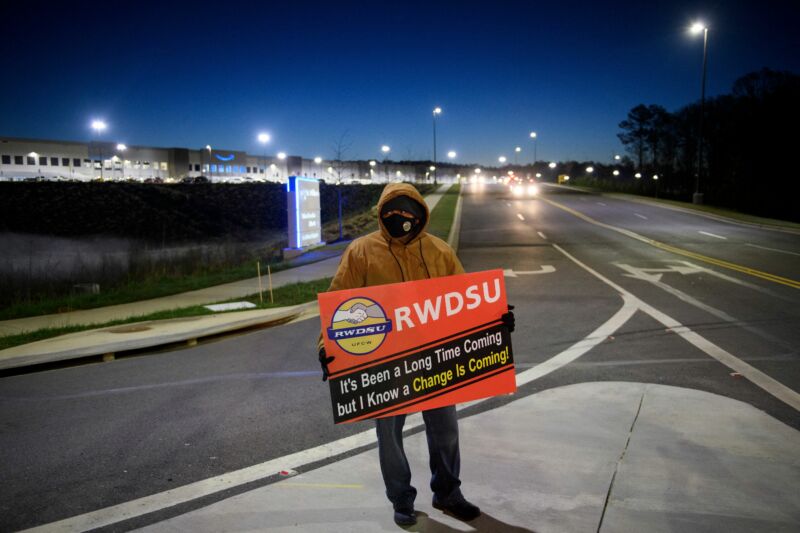Collective bargaining —
The unionization vote had huge stakes for Amazon and the labor movement.
Timothy B. Lee
–

Enlarge / A union supporter stands before sunrise outside the Amazon fulfillment center on March 29, 2021 in Bessemer, Alabama.
PATRICK T. FALLON/AFP via Getty Images
Update: A majority of workers have voted not to form a union at the Amazon Fulfillment Center in Bessemer, Alabama. The result of the NLRB’s initial vote count was 1,798 votes against the union and 738 in favor. Hundreds of additional ballots were not counted because their authenticity was disputed. But the “no” side already has a majority of the 3,215 votes cast, making the issue moot.
Original story, April 8: A closely watched effort to unionize an Amazon fulfillment center in Bessemer, Alabama appears to be headed for defeat. With about half the votes counted, 1,100 workers have voted against forming a union, while only 463 voted in favor.
The National Labor Relations Board is counting the 3,215 votes that were cast by workers at the Bessemer facility. The union needs to win at least half the votes in order to become the official representative of the roughly 6,000 workers at the Bessemer facility. Counting has ended for the evening and is scheduled to resume at 8:30 am Central Time on Friday.
The stakes are high for both Amazon and the labor movement. Amazon has more than 1.1 million workers overall, with hundreds of thousands working in fulfillment centers. A successful vote in Bessemer would embolden labor organizers at other Amazon fulfillment centers around the country. An organized workforce could force dramatic changes in the way Amazon manages its warehouses.
“We first started to talk about unionizing one day during a break,” said Jennifer Bates, a worker at the Bessemer warehouse who helped organize the union drive, during March Senate testimony. “People were upset about the breaks being too short and not having enough time to rest, about being humiliated to have to go through security checks.”
Amazon mounted an aggressive campaign against unionization. The company posted anti-union literature all over its facilities, including in bathroom stalls. Employees were required to attend regular meetings where Amazon presented anti-union arguments.
Union elections are ordinarily held in person, but this one was held by mail due to coronavirus concerns. As a result, a close election could lead to months of legal wrangling over which ballots were cast by eligible workers. But if the current two-to-one margin holds up, the union may have to concede quickly.
That isn’t to say organizers are going to give up.
“Our system is broken,” said Stuart Appelbaum, the president of the Retail, Wholesale and Department Store Union that led the organizing effort, in a statement to the Washington Post. “We will be calling on the labor board to hold Amazon accountable for its illegal and egregious behavior during the campaign.”

